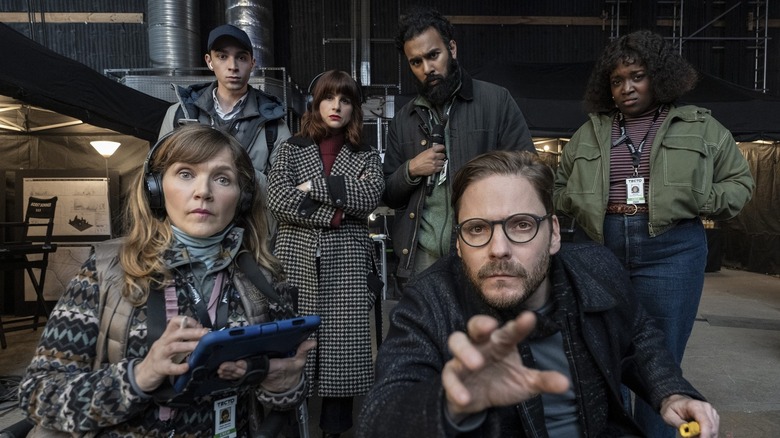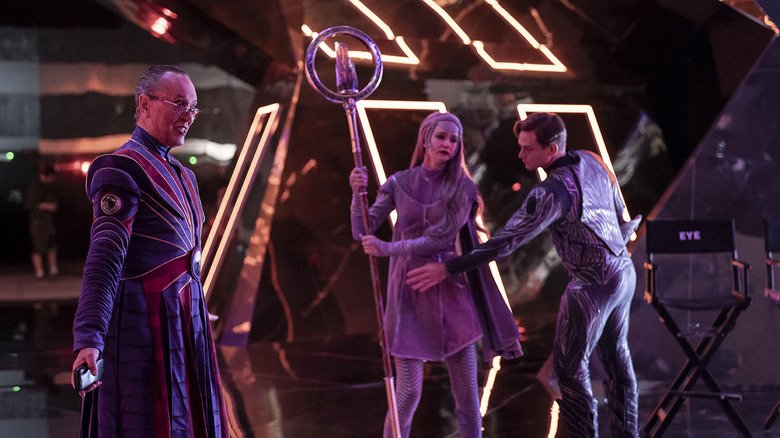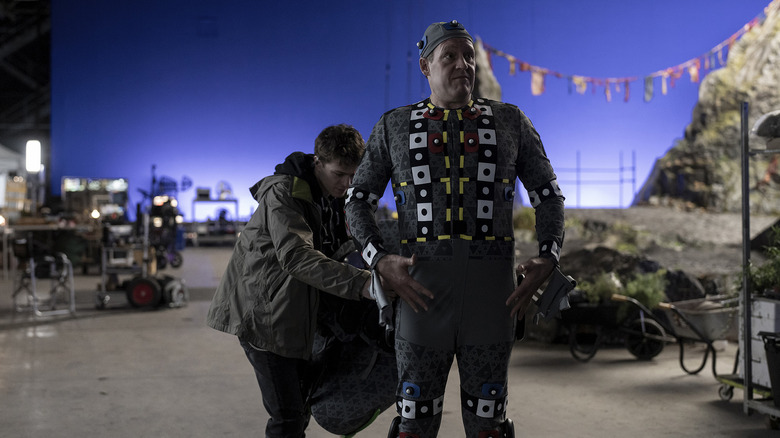The Franchise Review: HBO Super-Satire Has Fun Stars But Tired Discourse
- Richard E. Grant and Billy Magnussen are hilarious
- The sexism episode is very good
- The satire is often shallow and dated
- Weak ending to the season
Is it ironic or just coincidental that "The Franchise," an HBO sitcom about how comic book movie franchises are killing cinema, is airing right after "The Penguin," a spin-off of a comic book movie franchise? And, acknowledging this is absolutely comparing apples to oranges, what does it mean when "The Penguin" is somehow the better show in almost every way?
"The Franchise" follows the hectic production of "Tecto: Eye of the Storm," the latest entry in Maximum Studios' cinematic universe. The show frames this chaos primarily from the perspectives of 1st assistant director Daniel (Himesh Patel), a fan of the comics who wants the film to be good; and 3rd assistant director Dag (Lolly Adefope), who's under no illusions of it being anything but a piece of crap. Their award-winning director Eric (Daniel Brühl) is an egomaniac waiting for a call from Christopher Nolan. Himbo Adam (Billy Magnussen) hopes to break into the A-List playing the earthquake-causing hero Tecto, while his Shakespearean-trained co-star Peter (Richard E. Grant) sees himself above the material. Pat (Darren Goldstein), the studio boss, is too busy with the summer tentpole "Centurions 2" to pay this spiraling production the attention it needs.
The series, showrun by "Succession" writer Jon Brown, has its origins in a meeting between two of its executive producers, "Veep" creator Armando Iannucci and "Skyfall" director Sam Mendes, where Mendes shared stories about the absurd challenges from his time working within the James Bond franchise. Many of the show's stories of troubles within the franchise machine have some basis in reality. And yet much of the satire feels tired, like yesterday's Twitter Discourse reheated. By the end of the first season, the talented actors and snappy dialogue can't quite save "The Franchise" from exhaustion.
Not the strongest super-spoof
One challenge "The Franchise" faces when it comes to standing out is that audiences are almost as inundated with superhero parodies as they are with straight-up superheroes — and even the mainstream franchise productions are often (either brilliantly or insidiously, depending on your perspective) extremely self-aware. When "She-Hulk: Attorney at Law" made a funnier and more brutal mockery of Kevin Feige than "The Franchise" does, one questions how much bite this show's perspective really has.
The best genre satires come from a place of knowledge, and while this crew of writers knows how to put together creative profanities and compelling Sorkin-style walk-and-talks, I'm inclined to question how much they really know or care about the debates around the superhero genre. The "superheroes are killing cinema" perspective expressed through Dag mostly seems to come down to "this stuff is silly" — which it undoubtedly is, but I don't consider silliness a problem, and it's not the problem Martin Scorsese was talking about in the articles that kickstarted this interminable argument five years ago. The question of how seriously to take this stuff gets further muddled when Daniel talks about Eric's vision being a "dark and gritty" one, despite everything we see on set looking more like the camp of James Wan's "Aquaman" than the self-seriousness of Zack Snyder's "Batman v. Superman."
Aside from the issue of "superhero fatigue" actually affecting the box office in the 2020s, a lot of the industry satire feels like it would have been more relevant five years ago. The jokes about pandering to Chinese backers are funny in execution, but hasn't one of the big post-COVID box office stories been that the Chinese market no longer cares as much about American films? The episode about Maximum's "woman problem" also has a dated set-up — Marvel and DC are way more inclusive now than they were a decade ago — but ends up being the strongest episode overall because its central concern about how "fans" treat women in these franchises remains all too relevant. Katherine Waterston gives a great performance playing the broken-down Brie Larson stand-in, and the way Daniel opposes The Lilac Ghost's new powers not out of explicit misogyny but sheer nerd pedantry is an interesting wrinkle of conflict.
The actors — the actors playing the actors, to be precise — are the most fun part of "The Franchise." The archetype of a Shakespearean slumming it in franchise projects is a familiar one — Alan Rickman in "Galaxy Quest" remains the best example — but Richard E. Grant is perfect for it, and the fresh wrinkle to Peter's specific character is just how amusingly nasty he is. He wants to get canceled but can't, because everyone already expects him to be poorly behaved, ill-prepared, and horrifically un-PC. Billy Magnussen is also spot-on casting for an actor who looks like a "Chris"-level star but just isn't. A subplot about his superhero steroid regimen gets one of the biggest laughs, and the episode where he reunites with an old sitcom co-star is another highlight.
The ending falls apart
The Sam Mendes-directed pilot for "The Franchise" is a well-made half-hour despite its many obvious gags, so I was willing to give the show a chance, and a couple stronger episodes in the middle of the season grew on me. By the end of the first season, however, my frustrations with its shallowness as pop culture commentary overshadowed my appreciation of its modest comedic virtues.
Without getting into spoiler specifics, the end of the season plays as a hybrid of two of the biggest superhero movie controversies at once: the firing of Zack Snyder from "Justice League" and the last-minute cancelation of the "Batgirl" movie. Both of these messes are ripe for satire as illustrations of the real dark side of the superhero movie business — and, it must be said, of HBO's business daddy Warner Bros. Discovery. The letdown of the season finale is that it goes soft, going for simple manipulation to avoid actually confronting the corporate villains of those sagas.
Maybe this softened ending would have worked if the overall tone and message was closer to something like "The Fall Guy," a more celebratory take on the crazy work that goes into making even a mediocre blockbuster. But "The Franchise" still wants to be scathing, so the lack of bite where it matters most makes it just feel like a wash. Maximum Studios might keep making superhero movies forever, so "The Franchise" has easy narrative options to continue for more seasons, but I don't plan to keep watching (okay, maybe I'd keep watching clips of Richard E. Grant's best scenes).
"The Franchise" premieres on HBO and Max on October 6.


